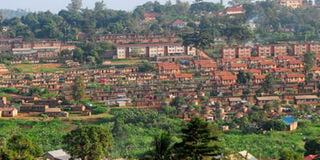Police barracks in Kampala in water, power crisis

An aerial view of Nsambya Police Barracks. File photo
KAMPALA- “Put yourself in a situation that you stay in a crowded dormitory without electricity and with one flush toilet that had no running water. Would you spend a night in it?” a police officer at Nsambya Police Barracks asked. “This is what we have been going through for a month”.
Barracks in Kampala Metropolitan Police Area have spent nearly a month without water and power creating a health crisis.
The most affected barracks are Nsambya and Naguru in Kampala city.
Another officer said they have turned to spring wells, which were condemned by health experts as contaminated with human waste.
The officers are caught in a tough situation that they can’t afford to turn to pay for water.
Their July salaries will also delay probably for a week or so after Ministry of Finance shuffled the police accounts department.
Police Spokesman, Mr Fred Enanga said that their city barracks don’t have power or water due to technical issues in the accounts department that have led to delays in payment of utility bills.
“Our barracks within Kampala Metropolitan Police have been affected. For the last two weeks, they haven’t had electricity or water,” Mr Enanga said on Thursday.
He said the institution doesn’t have an accounting officer (under-secretary), who has to authorise payments.
Officers below the rank of Assistant Inspector of Police, who make 80 per cent of the police strength of 43,000, must live in police barracks.
Government established a policy that bars police from accessing services on credit especially in areas of consumption and utilities.
Mr Enanga said the crisis will be solved in a week’s time after getting a substantive accounting officer, Mr Richard Arumadri, who replaced Mr Rogers Muhirwa.
National Water and Sewage Corporation and Umeme installed pre-paid metres in the barracks after reports of misuse of water and electricity.
However, police budgets show that the funds for utility services given to police are slightly above 50 per cent of their annual consumption, which cause shortages.




